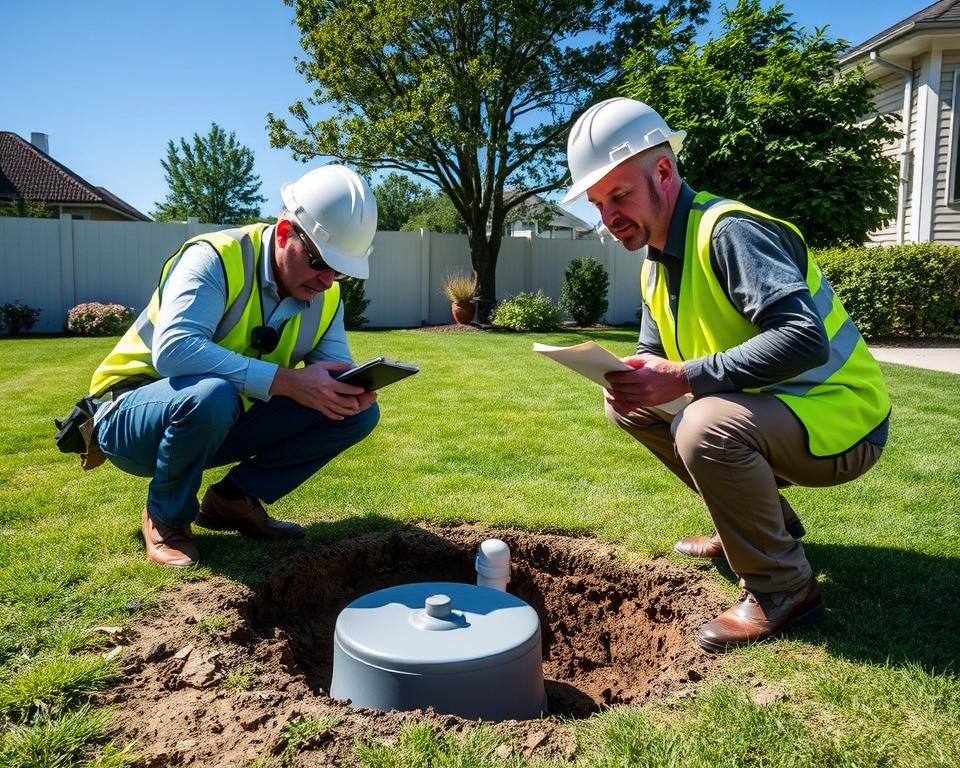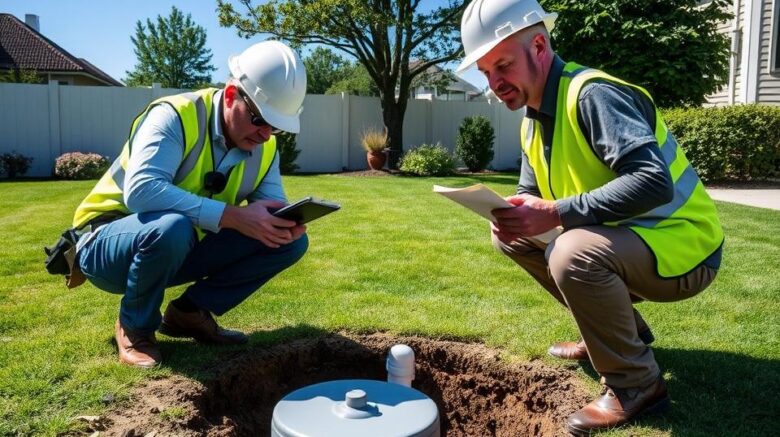Pumping Your Septic System
Do you ever think about how often you should schedule septic system pumping so you can dodge costly failures? With in excess of 20 percent of U.S. households depending on septic systems, understanding their maintenance is crucial. Having a clear idea of when to plan a septic tank service is critical to its longevity. Moreover, you can find budget-friendly septic pumping solutions that provide high-quality functionality while staying on budget. Below, we outline essential upkeep tips useful for every homeowner.
Key Highlights
- Regular septic system pumping is vital for efficient performance.
- Spotting the symptoms that signal the necessity for service can prevent major issues.
- Choosing qualified septic system pumpers guarantees top-quality maintenance.
- Cost-effective septic pumping options are available for homeowners.
- Routine inspections promote optimal system performance.
Getting to Know Your Septic System
A septic system performs a vital role in managing household wastewater, comprising several important components that function together. The initial drain line carries wastewater from your home to the septic tank, where the process starts. In the tank, an underground chamber, solids sink at the bottom, and bacteria decompose these solids, treating the waste efficiently.
The treated liquid outflow next travels from the septic tank to the distribution box, where it is spread evenly across the drain field or leach field. Here, the soil carries on with the filtration, continuing to purify the wastewater. Comprehending the functions of these septic system parts is essential. It enables homeowners to monitor and upkeep their systems efficiently.
Being aware of how your septic system operates lets you adopt preemptive maintenance measures. It’s advisable to have regular appointments with qualified service providers of septic systems – septic service. They supply crucial insights for optimal functioning of your system. These experts help in planning the required pump-outs and checks. This proactive approach can considerably extend your septic system’s lifespan.
The Value of Septic System Care
Caring for your septic tank on a routine basis is pivotal for homeowners who want their system to endure. A well-cared-for system provides peace of mind and safeguards your property’s value. Without appropriate care, you’re risking system breakdowns and health dangers.
Selecting a first-rate septic pumping service is crucial. They offer timely inspections and pump-outs, clearing out sludge and scum buildup. If maintenance is overlooked, emergency pumping may be required, which is costly.
Adhering to a regular maintenance plan is prudent. It includes professional evaluations and regular pumping. This preventative measure helps avoid urgent issues, creating a more secure living environment for everyone.

How to Tell Your Septic System Requires Service
Keeping an eye on septic system issues can sidestep budget-breaking repairs and major damage. Key signs show when your system needs a check. These include:
- Sluggish drains throughout the house
- Pooling water in the yard above the drain field
- Unpleasant odors near the septic tank or leach field
- Exceptionally thick grass growth in specific areas of your yard
These signs could indicate problems that might lead to your system failing. Prompt action is vital. Reaching out to septic pumping professionals for an inspection assists. Prompt response avoids initial issues from turning into major ones. Additionally, routine upkeep guarantees your system operates well and remains durable.
Best Practices for Septic System Pumping
Timely pumping of your septic tank is crucial to avoid hefty clogs and backups. It’s vital to determine the ideal schedule for maintenance. Homeowners should typically plan pumping every 2 to 5 years, based on the tank’s size and household wastewater levels. Heavy use of garbage disposals may require more frequent pumping.
Using professional pumpers ensures your tank gets a complete clean and check-up. During pumping, technicians look for any issues, such as broken baffles. Detecting these problems early avoids costlier expenses and inconveniences later. Routine pumping schedules and expert help provide your septic system’s efficient operation.
Routine Inspections for Optimal Performance
Routine inspections are essential for your septic system’s efficiency. Septic system inspections highlight minor issues before they grow. Experts advise inspections every three to five years, influenced by system size and household usage. This avoids costly fixes.
Keeping maintenance records is vital for monitoring your system’s condition. These records provide insights into previous inspections, repairs, and suitable intervals to schedule septic tank cleaning services. With this information, preparing for future upkeep becomes more straightforward, maintaining septic systems in prime shape.
Consistent inspections and detailed record-keeping not only improve system efficiency but also lengthen its life. This strategy protects the environment and the investment in a safe, operational home.
| Inspection Type | Recommendation Frequency | Benefits |
|---|---|---|
| Visual Inspection | Annually | Identify surface issues |
| Professional Inspection | Every 3–5 years | Assess functionality and detect problems |
| Septic Tank Pumping | Every 3–6 years | Prevent overflow and system failure |
Efficient Water Usage to Extend Septic Life
Mindful water use is essential for keeping your septic system sound. It not only helps the environment but also improves the performance of your home’s plumbing. By adopting easy, yet effective, conservation methods, homeowners can reduce wastewater.
Spread out your laundry activities over the week instead of completing them in a single day. This allows the septic system to process water better and prevents tank overflow. Opting for low-flow fixtures in your kitchens and bathrooms yields considerable water savings, keeping the water pressure up while reducing the flow rate, thus diminishing the amount of wastewater produced each day.
Swiftly fixing leaks is another way to assist your septic system. Even a small leak can lead to a large waste of water, overburdening the septic system. Through periodic inspections and repairs, you materially improve the system’s efficiency.
Emphasizing water conservation isn’t just advantageous for your septic system; it’s also a step towards sustainable living. Embedding such practices into everyday habits serves both your household and the planet.
Proper Handling of Household Waste
Homeowners play a vital role in keeping their septic system’s health by disposing of household waste correctly. It’s essential to avoid flushing non-biodegradable items like wipes, plastics, and other harmful products in the system. These items can cause clogs, causing pricey repairs and a drop in efficiency.
Composting food scraps and organic materials is a beneficial alternative to throwing them in the trash. This practice significantly lowers the amount of solid waste entering the septic tank. Focusing on biodegradable waste disposal helps maintain the ecological balance needed for effective waste management.
It’s vital to monitor what goes down the drains. Non-decomposable items can requiredemand more frequent septic tank pumping. By grasping and following correct waste disposal methods, you can guarantee a more efficient and long-lasting septic system.
Choosing Septic-Friendly Cleaners
The health of your septic system largely hinges on your choice of cleaning products. Opting for septic-safe cleaning products is paramount. These products safeguard the balance of beneficial bacteria that digest waste. Many standard cleaners contain harmful chemicals that endanger this balance, resulting in costly repairs or system failure.
Homeowners should look into natural alternatives that are both powerful and environmentally friendly. Common household items like baking soda, vinegar, and lemon juice are superb choices. These natural cleaners are not only effective but also maintain your septic system’s health.
Keeping away from products that contain antibacterial agents and chlorine bleach is important. Such substances harm the essential good bacteria, undermining your system’s functionality. By choosing sustainable products, you ensure both the efficiency and longevity of your septic system.
The Role of Bacteria in Your Septic System
Bacteria perform a key role in keeping your septic system healthy. They decompose solids naturally and enhance nutrient processing. A lack of healthy bacteria can trigger system failure, creating expensive repairs.
Homeowners can improve their system by introducing organic additives. These products increase beneficial bacteria, making waste decomposition faster. It’s important to select organic additives that are beneficial, not harmful, to the septic environment.
A healthy bacterial community is crucial to a septic system’s longevity and efficiency. It prevents solid buildup and cuts the need for repeated pumping. Focusing on bacterial health ensures waste management more effective and eco-friendly.
The Bottom Line
Septic system care is crucial for the life and functionality of your home’s wastewater system. Adhering to key maintenance tips prevents expensive repairs. Knowing routine pumping and inspections is fundamental. This ensures your septic system keeps in excellent condition.
Learning about your septic system’s operation and best practices in water and waste management is important. Engaging professionals like All in Sanitation delivers expertise. This supports your septic system’s long-term health and provides confidence.
Prioritizing proper septic maintenance today delivers future benefits. It safeguards your home and improves your family’s quality of life. Prioritizing septic system care delivers confidence with a well-maintained system.
